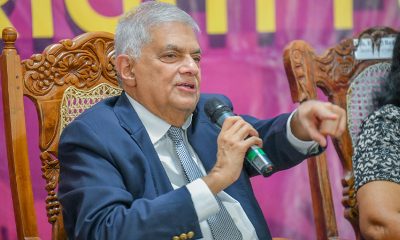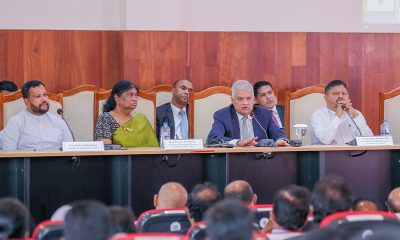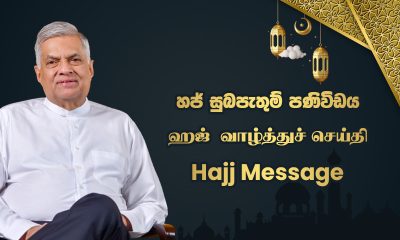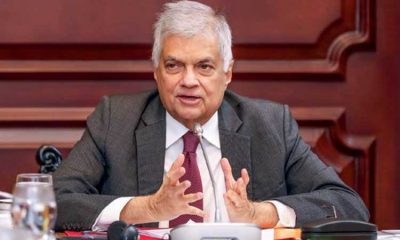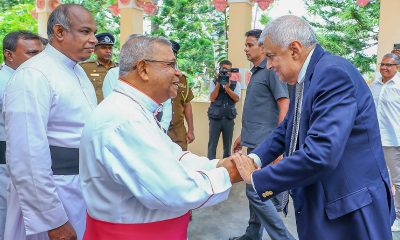News
No candidate vying for the presidency has announced plans to abolish executive powers – President

President Ranil Wickremesinghe participating in the “What’s New” dialogue on legal reforms with young legal professionals at a workshop held at the Presidential Secretariat.on Tuesday (28) reiterated that none of the candidates aspiring to run in the presidential election have announced their intention to abolish the executive powers associated with the position.
Elaborating further the President said:
“Sri Lanka boasts multiple governance systems. One resembles the English model, epitomized by the cabinet, while the other adopts the executive presidential system, where the President wields executive authority. The legislature holds legislative powers. Notably, the President and the legislature may hail from different political parties. Examining the Swiss parliamentary setup, parliament appoints seven individuals to the federal committee, granting executive authority to the Federal Council.
In adherence to a customary practice, the two primary parties receive two seats each, while the remaining parties are allocated one seat each. Subsequently, these councillors convene to discuss the distribution of responsibilities among institutions, collectively exercising executive authority. Additionally, the Prime Minister holds the authority to appoint and dismiss ministers within the cabinet. Annually, one of the seven councillors ascends to the Chairmanship.
Alternatively, the Donoughmore system, once employed in Sri Lanka, involved dividing the executive structure into seven components. Among these, one served as the speaker, while another was elected as the chairman, simultaneously assuming the role of minister. Further, a minister was designated as the Leader of the House. The governor appointed three additional secretaries, resulting in a council of ministers comprised of ten individuals. Among these, the chief secretary chaired the council, where decisions were deliberated and finalized.
Following the previous systems, the French model emerged, where the executive president is elected via popular vote and members of Parliament are chosen by the electorate. This approach is predominantly adopted in Sri Lanka, possessing both advantages and disadvantages. During President J. R. Jayawardena’s tenure as Executive President, significant strides were made for the country, marked by the implementation of major projects such as Mahaveli, Samanala wewa, and Lunugamvehera. Additionally, Kotte was elevated to the status of a capital city, and two trading zones were established. Notably, these developmental endeavours were executed amidst an eleven-year-long war.
Similarly, President Premadasa initiated the establishment of around two hundred garment factories. The presence of the executive presidency was pivotal in Sri Lanka’s victory in the war, thwarting foreign hopes of inducing crisis and government collapse. The ability to apply executive power, exemplified by President Mahinda Rajapaksa, facilitated the deployment of the military and eventual triumph in the conflict.
During the tenure of the good governance government, there was a notable disconnect between the Executive President and the rest of the government. The presence of executive powers was crucial in maintaining stability during the ‘Aragalaya’. This was evident when there was no clear successor for the premiership. On a particular occasion, when the President departed for Trincomalee, some individuals urged me to resign from my position as Prime Minister.
However, I asserted that I could only resign if there was a parliamentary majority, and even then, the resignation letter would need to be submitted to the President. Resigning under external pressure or due to personal reasons, such as threats to my residence, would risk the ascension of someone outside the democratic process to power.
In the future, we will hold the presidential election. None of the candidates vying for the position have announced plans to abolish its executive authority. It’s imperative that we develop a program geared towards reinforcing the parliament’s role and capabilities.
Currently, some executive powers have been delegated to the Provincial Council, while others have been assigned to various commissions. Furthermore, parliamentary oversight committees are operational. As more bills are introduced and debated in parliament, there will be a gradual shift of presidential powers to the Parliament, the legislative body.
Enacting laws that render the President accountable to Parliament is imperative. The government’s agenda for the next four years should be outlined through the newly introduced Economic Transformation Act. Progress on implemented programs each year ought to be reported to Parliament annually. Mr. Karu Jayasuriya’s proposed Jana Sabha system appears highly feasible. Additionally, it’s worth noting the practicality of the forthcoming gender equality law.”
Latest News
Navy seize an Indian fishing boat poaching in Mannar seas
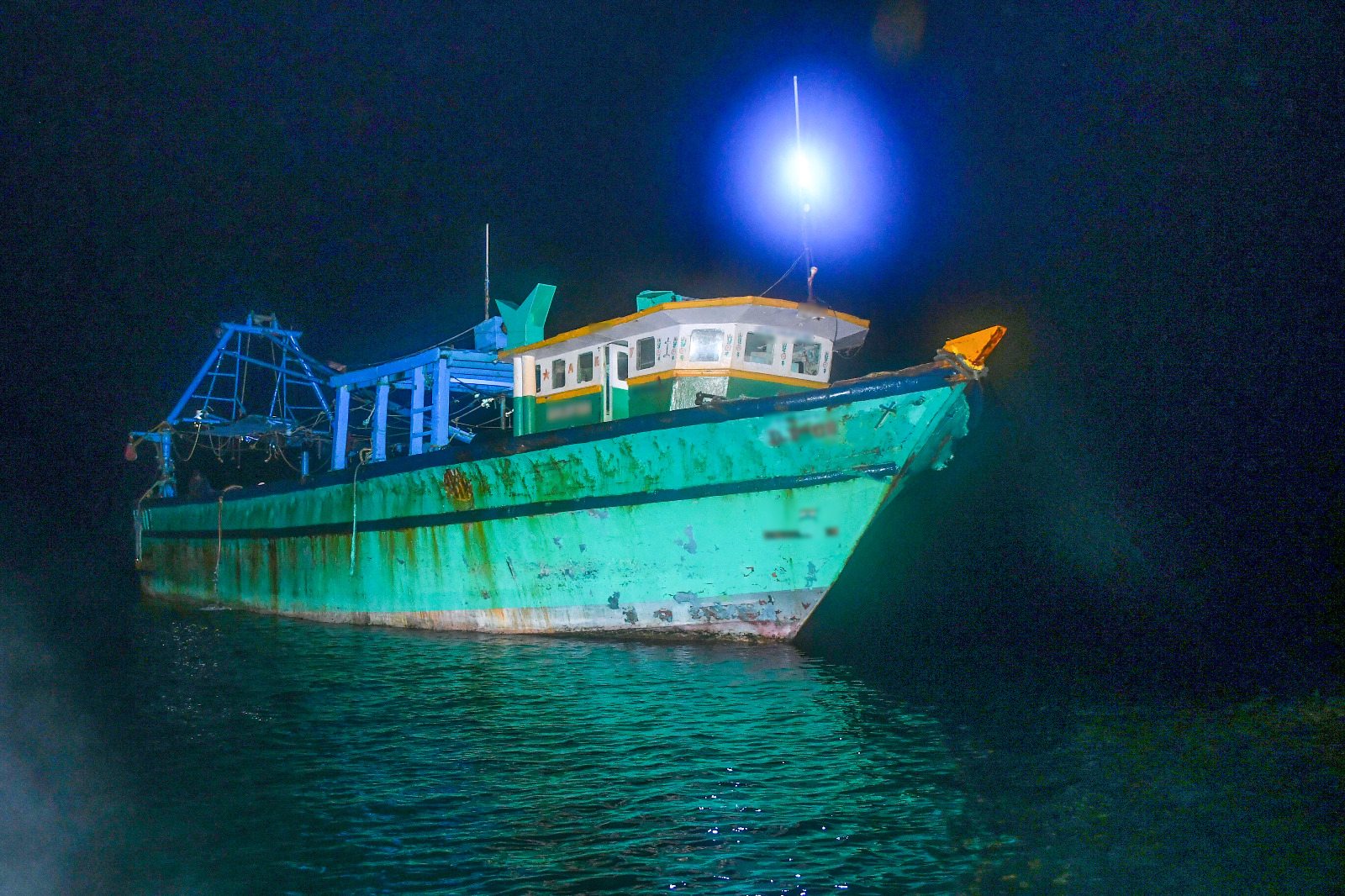
During an operation conducted in the dark hours of 22 Feb 26, the Sri Lanka Navy seized an Indian fishing boat and apprehended twelve (12) Indian fishermen while they were poaching in Sri Lankan waters, in the sea area south of Mannar.
The seized boat and the Indian fishermen were handed over to the Fisheries Inspector of Dikovita for onward legal proceedings.
News
Families of those sentenced to death for killing MP Atukorale seek AKD’s intervention
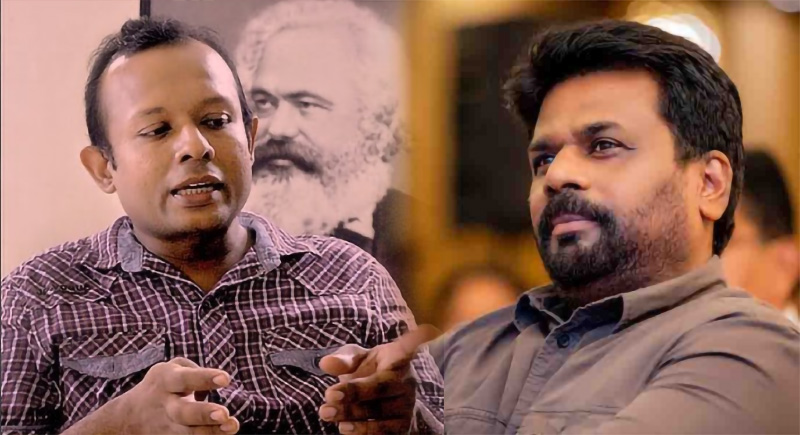
FSL assures legal backing for them
Families of those sentenced to death by the Three-member Gampaha High Trial-at-Bar, over the killing of SLPP MP Amarakeerthi Atukorale, and his police bodyguard, met a senior official of the Presidential Secretariat, yesterday (23), to seek backing for their move to appeal against the verdict.
Having made representations, they addressed the media, outside the Presidential Secretariat, where they declared their intention to move the higher court against the decision.
The SLPP MP and his security officer were killed by an Aragalaya mob on 09 May, 2022, at Nittambuwa. The same day Aragalaya mobs unleashed violence against the then government MPs across the country, torching dozens of their properties.
The Frontline Socialist Party (FSP) yesterday said that they would help the families of those sentenced to death to move court against the Gampaha High Court Trial-at-Bar decision. Responding to The Island queries, FSP spokesman Pubudu Jayagoda said that their representatives had already met the families and necessary work was being done to move the Supreme Court. Twenty three persons were acquitted and four handed six-month prison terms, suspended for five years
Jayagoda said that one of the HC judges differed in the ruling. Asked whether they received backing from any other political party and groups that had been involved in the 2022 protest campaign to defend those who had been found guilty, Jayagoda said such support was lacking.
The JVP/NPP played a significant role in the violent protest campaign that forced President Gotabaya Rajapaksa to step down. Pointing out that the Attorney General, too, was appealing against the court decision on the basis that the number of persons sentenced to death should be much higher, Jayagoda said that the Nittambuwa incident couldn’t be examined in isolation without taking into consideration the SLPP goon attack on Galle Face protesters on 09 May, 2022. (SF)
News
OPV leaves Baltimore, expected in Colombo in May
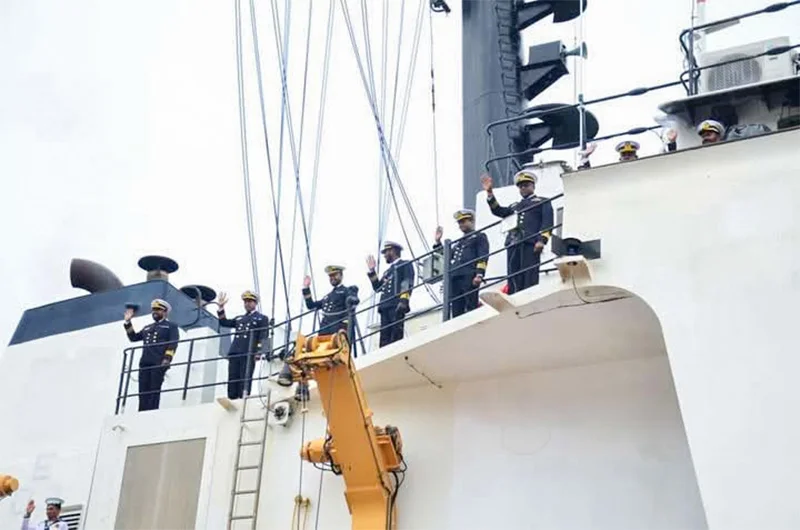
Offshore Patrol Vessel P 628 of the Sri Lanka Navy departed Baltimore, USA, for Colombo, on 20 February.
The ex-United States Coast Guard Cutter, USCGC Decisive was officially handed over to the SLN on 02 December, 2025, as the latest addition to the SLN fleet, under the Pennant Number P 628.
Measuring 64 metres in length, this ‘B-Type Reliance Class 210-foot Cutter’ is equipped with advanced technological systems and facilities, capable of conducting extensive surveillance operations spanning up to 6,000 nautical miles per patrol.
The vessel’s voyage to Colombo is historic, possibly marking the longest-ever passage undertaken by a Sri Lanka Navy ship. Covering approximately 14,775 nautical miles, the journey will see the P 628 navigate from Baltimore through the Atlantic Ocean, the Panama Canal (a first for a Sri Lankan naval vessel), the Pacific Ocean, and into the Indian Ocean, via the Straits of Malacca. The ship is expected to arrive in Sri Lanka during the first week of May, 2026.
-

 Features3 days ago
Features3 days agoWhy does the state threaten Its people with yet another anti-terror law?
-

 Features3 days ago
Features3 days agoReconciliation, Mood of the Nation and the NPP Government
-

 Features3 days ago
Features3 days agoVictor Melder turns 90: Railwayman and bibliophile extraordinary
-

 Features2 days ago
Features2 days agoLOVEABLE BUT LETHAL: When four-legged stars remind us of a silent killer
-

 Features3 days ago
Features3 days agoVictor, the Friend of the Foreign Press
-

 Latest News4 days ago
Latest News4 days agoNew Zealand meet familiar opponents Pakistan at spin-friendly Premadasa
-

 Latest News4 days ago
Latest News4 days agoTariffs ruling is major blow to Trump’s second-term agenda
-

 Latest News4 days ago
Latest News4 days agoECB push back at Pakistan ‘shadow-ban’ reports ahead of Hundred auction


